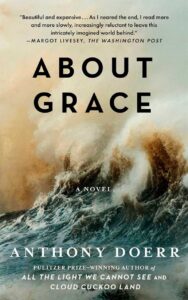Book Short
About Grace
by Anthony Doerr
By Stephanie Miller

David Winkler dreams the future. While sometimes happy, often the dreams foretell death and destruction and they leave an indelible scar on his childhood. Decades later, when he repeatedly dreams that he will be unable to save his newborn daughter Grace from a flood, the water actually starts to rise and he flees—frightened into assuming that the lack of his presence will prevent her death.
Trying to put distance between himself and his fear, he boards a freighter bound for Brazil, randomly exiting the ship on a remote Caribbean Island. He is a mess—penniless, ragged, weary, scared, and alone. A kind postal service worker takes him in and this former meteorologist becomes the groundskeeper for a small inn. Existing in a cloud of panic over his daughter, he tries to reach his wife. There is no reply. He continues to dream.
“About Grace“ is Pulitzer Prize-winning Anthony Doerr’s debut novel, re-introduced after the success of the later books, All the Light We Cannot See and Cloud Cuckoo Land. I found it on the softly-lit shelves of the beautiful Mechanic’s Hall library (A treasure in our midst! Please go there!), and it is a breathtaking book of unceasing longing.
The title is apt. Winkler’s whole life is centered on his daughter Grace—is she alive? Did he kill her by leaving? Would she have died if he stayed? Will she welcome him back in her life? At the same time, his continued existence depends on others giving him grace, seeing something in him that makes him worth saving from himself.
A Journey to Forgiveness
Some of the most beautiful passages are about the universal human longing for grace. Not just forgiveness, but understanding. Winkler’s mother understands and respects his fearful dreaming. His Carribean colleagues accept his solitude and dangerous sleepwalking. In a search across the country for any “Grace Winkler,” he knocks on doors and ends up having dinner or coffee or long conversations with strangers who respect his quest, despite not quite liking or understanding it. A trucker drives him from the Midwest to Alaska, playing loud music, chatting without needing a reply, and buying the coffee. As he drops the bedraggled Winkler off, he reaches over and hands him a pair of tennis shoes in a final act of kindness that seems to say, “I see you, and honor even your strange behavior as human.”
Set in Alaska, Ohio, and the Caribbean, this sweeping novel takes us on a radiant journey of love, forgiveness, and compassion. It’s the kind of story that remembers to tell us what each key experience smells like. It captured me and swept me along, but I kept resisting that forward motion. I wanted to savor this story, despite the sadness and loneliness.
MicroShorts
The Republic of Pirates, Being the true and surprising story of the Caribbean Pirates and the man who brought them down, by Colin Woodard (MAINE AUTHOR)
Ahoy, matey! Pirates really did rule the Caribbean for several decades in the early 1700’s when characters like Black Sam Bellamy, Blackbeard, and Charles Vane sacked merchant and slave ships, cut off trade routes, and challenged entire squadrons of British, French, and Spanish warships. They created an democratic society with principles such as: everyone shares equally in the spoils, the ship’s sailors can vote to sink a captured ship or release its captain and crew, or even toss their captain out of power by a simple majority. In the process, they challenged European imperialism and fanned the flame of democracy that helped inspire the American revolution. Pirates were real life heroes to many people—the Robin Hoods of the day. Historian Woodard tells the real story in his usual detailed, human, and punchy style, sending the ships of Pirate Nation out to sea again.
The History of a Difficult Child, by Mihret Sibhat
Even before she is born, clever and energetic Selma Asmelash—the youngest of a large boisterous Ethiopian family—questions everything and agitates against social boundaries and society pressures she can’t yet comprehend. She agitates against the edges as her land-owning family is scorned by the neighborhood and adapts to regime change. Sibhat transports us fully to a foreign land with a different set of social constructs. Just learning about the history of Ethiopia makes this novel worthwhile. It’s a beautifully rendered saga of an emotionally tumultuous—but very loving and loyal—family. Perhaps we can all relate to the frustrations of being limited when we want to embrace a new opportunity. All the while, Selma the difficult child has tremendous capacity for love and an indomitable spirit.
Ordinary Grace, by William Kent Krueger
Four deaths in one summer rock the world of thirteen-year-old Frank Drum, a preacher’s son: Accident. Nature. Suicide. Murder. Told from Frank’s perspective forty years later, we experience this fast-paced story with both the careless wisdom of a boy as well as the questioning muse of a mid-life reflection. Even after four decades, Frank struggles to understand how his childhood world fell apart around him that summer. He needed grace then and needs to give himself grace now. Krueger’s other novel, “This Tender Land,” also has child protagonists, and this one is written in that same lovely, engaging style: a flowing, melodic narrative driven by rich dialog.





